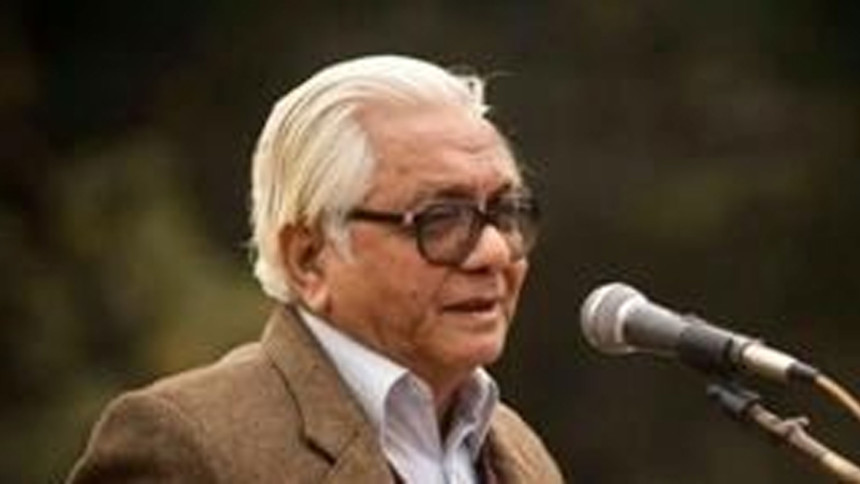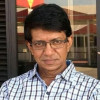Badruddin Umar: Our leading Marxist revolutionary

December 20 marks the 89th birthday of Badruddin Umar. Bangladesh's foremost Marxist revolutionary—one who has been speaking truth to power for more than six decades now—Umar is the author of more than a hundred books and countless articles. His three-volume work on our Language Movement of 1952 called Purba Banglar Bhasha Andolon o Tatkaleen Rajneeti (The Language Movement in East Bengal and Contemporaneous Politics; 1970, 1976, 1981) is trailblazing, while his tour de force also includes his two-volume work titled The Emergence of Bangladesh (2004, 2006), published by Oxford University Press.
Indeed, we are yet to assess the entire range—staggering as it is—of Umar's contributions to studies of politics, culture and history, among others. I had the privilege of working with Umar closely for several years in the 1990s, as I worked as the General Secretary of Bangladesh Lekhak Shibir—the country's oldest national organisation of writers, artists and activists on the left—an organisation that Umar had led as its president for many years.
Theorist, historian, columnist, essayist, researcher, educationist, editor and political activist, Badruddin Umar studied at the University of Dhaka (DU) and Oxford University. He received his Honours degree in Philosophy, Politics and Economics from Oxford. He first taught philosophy at DU, and at only 32, Umar joined Rajshahi University as the founder-chair of the Department of Political Science. He also founded the Department of Sociology there.
But in 1968—being in conflict with the government of Pakistan—Umar willingly abandoned his extraordinary academic career and turned to full-time political activism dedicated to the cause of peasants and workers. He has since been involved in communist politics while playing the role of a combative intellectual, for whom "writing is fighting." Umar is currently President of the National Liberation Council in Bangladesh and an active member of the Anti-Imperialist and Anti-Fascist Committee in the country. Also, he has been tirelessly editing the left magazine called Sanskriti for more than four decades now.
Given space constraints, I can barely even scratch the surface of Umar's massive oeuvre. But I should point out that Umar made his interventions as a historically grounded and politically engaged writer with the publications of his unparalleled trilogy—Sampradayikata (Communalism, 1966), Sanskritir Sankat (The Crisis of Culture, 1967), and Sanskritik Sampradayikata (Cultural Communalism, 1969). They are all groundbreaking interventions that for the first time acutely theorise in our contexts the dialectics of culture and politics vis-a-vis the phenomenal forms of "communalism." Indeed, no other writer has broached the question of communalism—while accentuating a historically specific interplay between colonialism and communalism itself—in ways in which Umar has done.
In short, Umar is a first-rate, indeed an outstanding, theorist of communalism in our part of the world. But to say that Umar is just a theorist of communalism is by no means adequate. When there was a strong need in the 1960s for a theoretical framework within which Bengali nationalism could be grasped in all its possible configurations and contours, Umar's trilogy made significant intellectual contributions to the growth of Bengali nationalism itself. To call him an early theorist of Bengali nationalism is certainly a right move in the direction of characterising part of his work.
Despite his extensive body of work, one may tabulate at least some of Umar's characteristic theoretical and thematic preoccupations pursued to varying degrees over the last six decades, during which he has been exemplarily steadfast in his commitment to the democratic and socialist transformation of class society. Some of those preoccupations, then, encompass the class question and for that matter the historical formations of the ruling classes and other classes in Bangladesh; the questions of realpolitik itself, informed as they all are by Marxism-Leninism as a rich body of dialectically engaged and interventionist analytic apparatuses and practices; the "political physics" of mass movements, including peasant, working-class and national liberation movements themselves; the rise of a historically determinate form of fascism in India and Bangladesh; and the demystifying and devastating ideology-critiques of the lumpenbourgeois political culture in Bangladesh, among numerous other topics.
Let me now briefly return to Umar's three-volume work on our Language Movement. It is here where one can underline Badruddin Umar's contributions as a historian. But to say that Umar is an important historian of that movement is only a slender acknowledgement of his actual achievements. Umar's contributions primarily reside in mobilising, for the first time in our country, a particularly radical and sustained approach that views history itself from below or that recognises the people themselves—workers and peasants in particular—as the true protagonists of history. Running against the grain of traditional, bourgeois, elitist and colonialist historiographies, Umar's work for the first time—empirically, historically and analytically—reveals that the Language Movement is not just a movement of some middle-class leaders or enthusiasts, but a movement of the masses, a movement in which their liberationist and emancipatory consciousness manifested itself in some form.
On January 12, 2016, the poet Alfred Khokon and I visited Badruddin Umar at his residence in Mirpur, Dhaka. That evening was full of Umar's energetic and spirited presence, accompanied by his unflagging verbal zest. He recounted many stories of his life, including the ones that are not probably covered in his multi-volume autobiography Amar Jeebon (My Life). I did not know until then that Umar could recite so wonderfully well! He recited verses first from Madhusudan Dutta and then from Rabindranath Tagore. And, finally, from Ghalib and the great Urdu Marxist poet Faiz Ahmed Faiz.
Umar recalled his meetings with Faiz himself, while telling us how he felt when he received a lovely letter from Faiz at a time when the poet was visiting Algeria. Umar also fondly recalled his conversations with the world-famous Marxist Ernest Mandel—the author of Late Capitalism—and the American Marxist political economist Paul Sweezy. Both of them respected Umar for his work, although Umar did not always concur with them.
Let me conclude with a few words concerning Umar's character and disposition. Unusually courageous and uncompromising and principled as he has always been, Badruddin Umar has never in his life sought power in the establishment and cheap comforts in his life. Simplicity, straightforwardness and honesty are the hallmarks of Umar. Further, it is none but Badruddin Umar who could reject, as he did, prize after prize— and the most "prestigious" ones at that—including the Bangladesh Itihas Parishad Prize, the Bangla Academy Prize, and even the Ekushey Padak, telling us rightly that prizes are never innocent vis-a-vis the power of mainstream institutions. In this respect—as in others—Umar has simply no parallel in the history of Bangladesh. It's not for nothing that Ahmed Sofa said once: "I'm proud to be alive in the time of Umar." Indeed, Umar represents a paradigmatic combination of oppositionality, integrity and dignity in a society where compromise and opportunism continue to be deemed the qualities of the "fittest" and the "smartest".
On the occasion of his 89th birthday, I dedicate to Badruddin Umar a short poem by his own favourite poet and comrade Faiz Ahmed Faiz—a poem that I myself translated into English, a poem whose injunction is already realised in the life and work of Umar:
Speak, your lips are free.
Speak, it is your own tongue.
Speak, it is your own body.
Speak, your life is still yours.
See how in the blacksmith's shop
The flame burns wild, the iron glows red;
The locks open their jaws,
And every chain begins to break.
Speak, this brief hour is long enough
Before the death of body and tongue:
Speak, 'cause the truth is not dead yet,
Speak, speak, whatever you must speak.
Azfar Hussain teaches in the Integrative, Religious, and Intercultural Studies Department within the Brooks College of Interdisciplinary Studies, Grand Valley State University in Michigan, and is Vice-President of the Global Center for Advanced Studies, New York, USA.


 For all latest news, follow The Daily Star's Google News channel.
For all latest news, follow The Daily Star's Google News channel. 



Comments